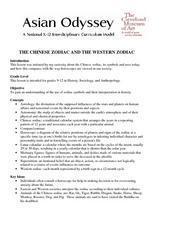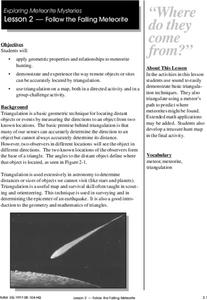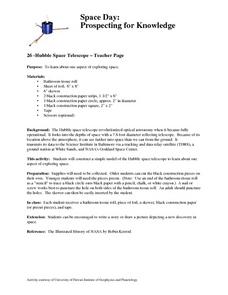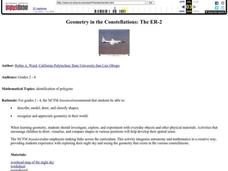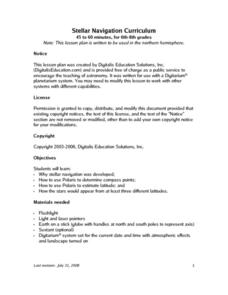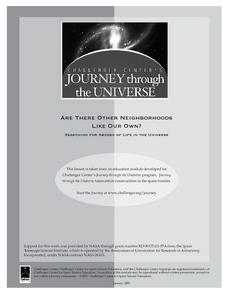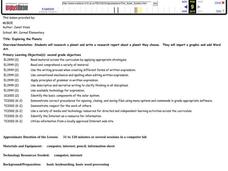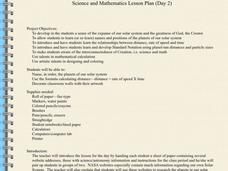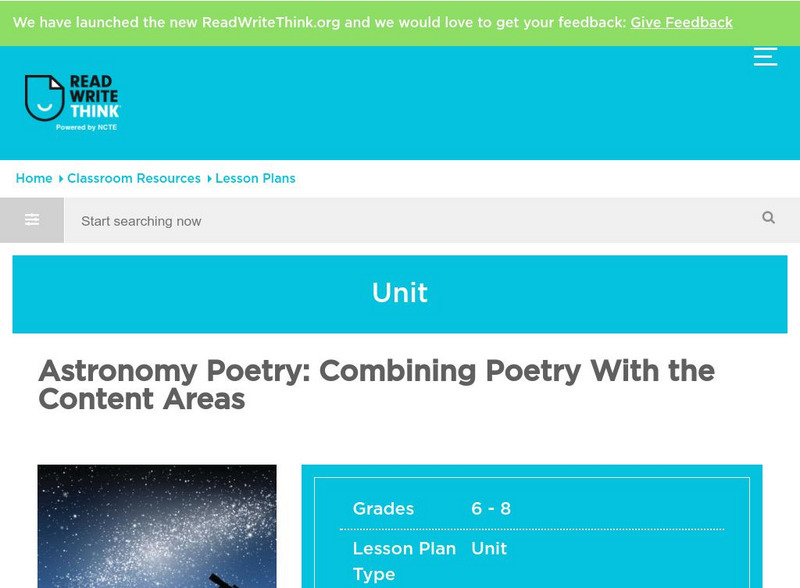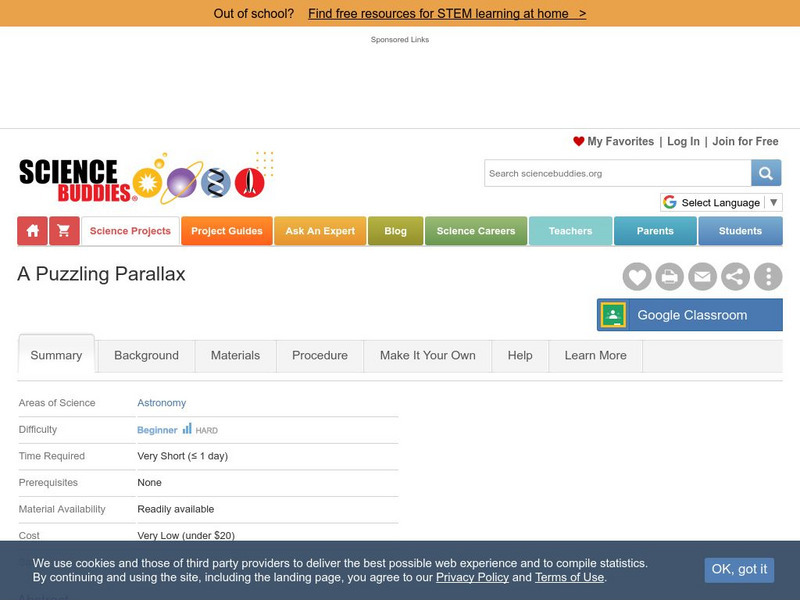Curated OER
The Chinese Zodiac And The Western Zodiac
High schoolers create individual horoscopes that contrast and compare Western and
Chinese views of their futures using poster boards and magic markers. In-class discussion is used to evaluate the use of the Zodiac in different cultures.
Curated OER
Follow The Falling Meteorite
Middle schoolers investigate the supposed traveling path of a meteorite. They use sound in order to triangulate the path. The results of the experiment are written on a map to display the path of the meteorite. The culminating activity...
Curated OER
Model Professionals
Students learn about one scientist's quest to make her field of canopy ecology accessible to a wider audience and to synthesize their knowledge by developing toy figures that could potentially educate children about different scientific...
Curated OER
Remote Control
Students explore and evaluate several distance learning Web sites. They defend whether or not they would like to participate in the distance learning experience by either writing a proposal for including this distance learning project...
Curated OER
Constellations
Learners explore constellations. They read trade books about constellations and write notes including their locations, origins, and names. They research and report on one constellation in the Northern Hemisphere and share their report...
Curated OER
Spacd Day:Probing For Knowledge
Young scholars investigate the uses and purpose of the Hubble telescope. They create a model of the telescope and conduct research about the history behind the invention of it. Students use the information in order to create a context...
Curated OER
Geometry in the Constellations: The ER-2
Students discuss reasons to record the location of stars. They view a picture of the night sky, and discuss constellations. Students complete a worksheet of the various shapes they see in the constellations.
Curated OER
Stellar Navigation Curriculum
Students investigate the concept of star mapping and how it is used in space navigation. They conduct various activities to see the effect of mapping. Also the teacher uses models and demonstrations in order to communicate the main...
Curated OER
Stellar Lunar Curriculum
Students engage in a instructional activity about the moon and three different constellations. They conduct research using a variety of resources. The teacher leads the class with demonstrations and discussion groups. The research is...
Curated OER
Hubble Space Telescope
Young scholars investigate the universe through the eyes of the Hubble space telescope. They conduct research from looking at the universe that is simulated with a digital projector. The images are projected onto the wall in a simulation...
Curated OER
Are There Other Neighborhoods Like Our Own?
Learners investigate the possibility of life existing on other planets. They conduct research using a variety of resources. The lesson includes an overview that is used for classroom discussion practices. They tell the teacher how to...
Curated OER
Is It Lunar or Lunacy?
Sixth graders are introduced to the moon and its phases. Individually, they draw a sketch of each phase of the moon and read a short article about Galileo. To end the lesson, they examine the difference between refracting and...
Curated OER
Are We Alone
Seventh graders collect/analyze data and draw conclusions; support reasoning by using a variety of evidence; construct logical arguments; access information at remote sites using telecommunications; apply the concept of percent;...
Curated OER
Exploring the Planets
Students research a planet and write a research report about a planet they choose. They import a graphic and add Word Art. They type a paragraph with a topic sentence and at least 3 supporting sentences using a word processing program.
Curated OER
Lives of Stars
Pupils take notes on the lives of stars. In this lesson on stars, students take notes alongside a PowerPoint presentation about the lives of stars.
Curated OER
The Solar System
Young scholars research the characteristics of planets in our solar system. In this space science lesson, students create a solar system model with each planet arranged according to their distance from the sun. They solve problems using...
Curated OER
Soil Comparison and Analysis
Students perform tests on different soil samples. In this earth science activity, students classify the soil into groups according to test results. They write a lab report following a certain criteria.
Curated OER
Make a Spaceship
Students create a spaceship, satellite, or space station. In this space lesson plan, students consider design elements for buildings and objects in space. Students use K'Nex, Legos, or other household materials for their creation....
ReadWriteThink
Read Write Think: Astronomy Poetry: Combining Poetry With the Content Areas
In this lesson plan, students listen to and discuss poetry that pertains to the study of astronomy and write their own poems to enhance their learning of the subject. As a final project, students use the ReadWriteThink Printing Press to...
Science Buddies
Science Buddies: Kinesthetic Astronomy: Earth's Rotation
This kinesthetic activity will demonstrate concepts like rotation and orbit, clarify movement and direction, and help students understand why earthlings see different things in the sky.
Science Buddies
Science Buddies: Kinesthetic Astronomy: Longer Days, Shorter Nights
This kinesthetic activity demonstrates to young scholars that the Earth's tilt is what is responsible for shifting light patterns and the change in seasons.
Other
National Optical Astronomy Observatory: Jewels of the Night
Using the Jewelbox Cluster, students determine the cluster's age based on measurements of its color and brightness.
NASA
Nasa: Kepler: A Search for Habitable Planets: Transit Tracks
Classroom lesson for teaching astronomy uses PowerPoint presentations and illustrations of Kepler's light curves used to discover planets.
Science Buddies
Science Buddies: A Puzzling Parallax
Did you know that ancient astronomers could measure the distance to other stars? They could also distinguish between stars and planets. How could they do that without modern technology of telescopes? See if you can discover the link...
Other popular searches
- Astronomy and Space Science
- Astronomy Vocabulary
- Planets and Astronomy
- Astronomy Activity
- Science Astronomy
- Ancient Astronomy
- Astronomy Lesson Plans
- History of Astronomy
- Space Science Astronomy
- Space and Astronomy
- Astronomy Navigation
- Astronomy History


